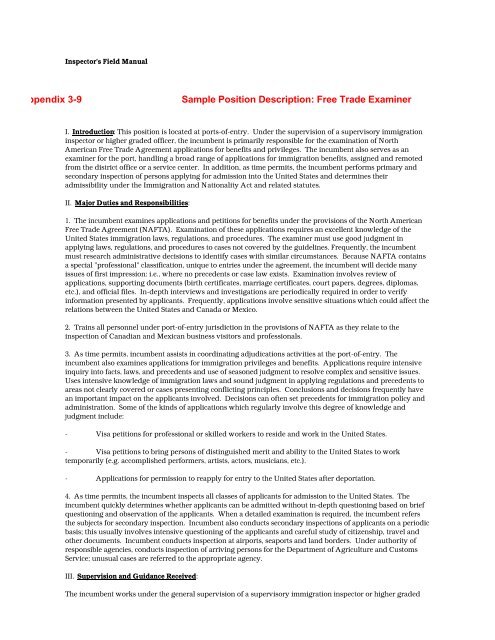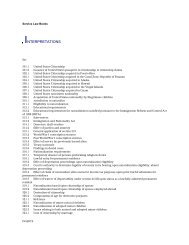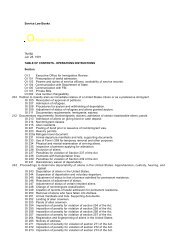Create successful ePaper yourself
Turn your PDF publications into a flip-book with our unique Google optimized e-Paper software.
<strong>Inspector's</strong> <strong>Field</strong> <strong>Manual</strong><br />
ppendix 3-9 Sample Position Description: Free Trade Examiner<br />
I. Introduction: This position is located at ports-of-entry. Under the supervision of a supervisory immigration<br />
inspector or higher graded officer, the incumbent is primarily responsible for the examination of North<br />
American Free Trade Agreement applications for benefits and privileges. The incumbent also serves as an<br />
examiner for the port, handling a broad range of applications for immigration benefits, assigned and remoted<br />
from the district office or a service center. In addition, as time permits, the incumbent performs primary and<br />
secondary inspection of persons applying for admission into the United States and determines their<br />
admissibility under the Immigration and Nationality Act and related statutes.<br />
II. Major Duties and Responsibilities:<br />
1. The incumbent examines applications and petitions for benefits under the provisions of the North American<br />
Free Trade Agreement (NAFTA). Examination of these applications requires an excellent knowledge of the<br />
United States immigration laws, regulations, and procedures. The examiner must use good judgment in<br />
applying laws, regulations, and procedures to cases not covered by the guidelines. Frequently, the incumbent<br />
must research administrative decisions to identify cases with similar circumstances. Because NAFTA contains<br />
a special "professional" classification, unique to entries under the agreement, the incumbent will decide many<br />
issues of first impression: i.e., where no precedents or case law exists. Examination involves review of<br />
applications, supporting documents (birth certificates, marriage certificates, court papers, degrees, diplomas,<br />
etc.), and official files. In-depth interviews and investigations are periodically required in order to verify<br />
information presented by applicants. Frequently, applications involve sensitive situations which could affect the<br />
relations between the United States and Canada or Mexico.<br />
2. Trains all personnel under port-of-entry jurisdiction in the provisions of NAFTA as they relate to the<br />
inspection of Canadian and Mexican business visitors and professionals.<br />
3. As time permits, incumbent assists in coordinating adjudications activities at the port-of-entry. The<br />
incumbent also examines applications for immigration privileges and benefits. Applications require intensive<br />
inquiry into facts, laws, and precedents and use of seasoned judgment to resolve complex and sensitive issues.<br />
Uses intensive knowledge of immigration laws and sound judgment in applying regulations and precedents to<br />
areas not clearly covered or cases presenting conflicting principles. Conclusions and decisions frequently have<br />
an important impact on the applicants involved. Decisions can often set precedents for immigration policy and<br />
administration. Some of the kinds of applications which regularly involve this degree of knowledge and<br />
judgment include:<br />
- Visa petitions for professional or skilled workers to reside and work in the United States.<br />
- Visa petitions to bring persons of distinguished merit and ability to the United States to work<br />
temporarily (e.g. accomplished performers, artists, actors, musicians, etc.).<br />
- Applications for permission to reapply for entry to the United States after deportation.<br />
4. As time permits, the incumbent inspects all classes of applicants for admission to the United States. The<br />
incumbent quickly determines whether applicants can be admitted without in-depth questioning based on brief<br />
questioning and observation of the applicants. When a detailed examination is required, the incumbent refers<br />
the subjects for secondary inspection. Incumbent also conducts secondary inspections of applicants on a periodic<br />
basis; this usually involves intensive questioning of the applicants and careful study of citizenship, travel and<br />
other documents. Incumbent conducts inspection at airports, seaports and land borders. Under authority of<br />
responsible agencies, conducts inspection of arriving persons for the Department of Agriculture and Customs<br />
Service; unusual cases are referred to the appropriate agency.<br />
III. Supervision and Guidance Received:<br />
The incumbent works under the general supervision of a supervisory immigration inspector or higher graded




